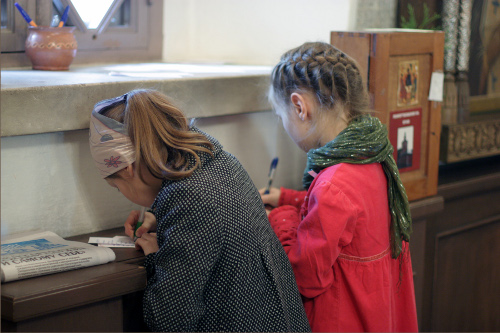“Train up a child in the way he should go, and when he is old he will not depart from it” (Proverbs 22:6).
If someone told you that you would have no problems with your children if you raised them a certain way, would you be interested in learning more? Who wouldn’t? For parents, the upbringing of children is the most important and sacred duty in life. And if we carry out that duty according to the teachings of the Church Fathers, God will help us to raise up Christian children who will be a joy to behold.
Our Number One Priority to Our Children: Raising Them Close to God
Of course, as Orthodox Christian parents, we all want to raise children who will grow to become good, responsible and faithful Orthodox Christians. That is why most of us have our children baptized, bring them to church on Sundays, take them to Sunday school, and have them receive Holy Communion regularly. Many of us might think that is the extent of our parental responsibility for raising up a child close to God, but is it?
While it’s a good start, the Fathers of the Church say that it’s not enough. They say that the spiritual well- being of our children should take priority over their material needs, their secular education and their preparation for worldly success, as St. John Chrysostom explains: “We are so concerned with our children’s schooling [and worldly success]; if only we were equally zealous in bringing them up in the discipline and instruction of the Lord… This, then, is our task: to educate both ourselves and our children in godliness; otherwise what answer will we have before Christ’s judgment seat?” (St. John Chrysostom, On Marriage and Family Life, SVS Press, 1986, p.67, 71).
A recurring theme in the writings of the Fathers is that the upbringing of our children in godliness is the most important task of parents, a 24/7 job.
It is a responsibility with eternal implications which requires our utmost personal discipline, vigilance, effort, and dependence on God’s grace.
The Example of the Parents
On a pilgrimage to the Monastery of St. Arsenios the Cappadocian my wife and I made when we lived in Greece for a year, we sat down to speak with Fr. Theoklytos, a very gentle, humble and surprisingly humorous elder of the monastery. Although we did not yet have children at the time, my wife asked the elder how we could be good parents if, God willing, we were to have children one day.
The Elder paused, then looked up at us with his gentle and disarming gaze and said, “To raise good children, you need to love each other.” We will never forget the simplicity and conviction with which he answered a question we thought would require a complicated answer.
The Elder’s simple response reinforced a foundational teaching of the Church regarding child rearing: If husband and wife truly love each other, as the Fathers of the Church teach, then the children will have an ideal model of how to love God and their fellow man.
St. John Chrysostom, in a more general sense, speaks about the centrality of the parents’ example for molding multiple facets of the child’s development: “For generally the children acquire the character of their parents, are formed in the mold of their parents’ temperament, love the same things their parents love, talk in the same fashion, and work for the same ends” (St. John Chrysostom, On Marriage and Family Life, SVS Press, 1986, p. 64).
In addition to the good example of parents, the Fathers speak about the active intervention of parents required to direct and mold the will of the child.

Molding the Will of the Child
What most of us will discover when we view our child-rearing methods through an Orthodox Patristic perspective are that we are faced with the risk of allowing the child to develop a powerful self-will. A strong self-will, which develops very early in life in the absence of proper parental direction, renders spiritual growth much more difficult.
What does this mean? It means that later in life it will be very challenging—in some instances impossible –- to get the self–willed child to voluntarily be attentive during church services, to fast, to respect parental authority, and to grow in the image and likeness of Christ as a kind, gentle and forgiving child of God.
The words of St. Theophan the Recluse impress upon us the importance of molding the will of a child: “The will of the parents should be imprinted upon each step – of course in a general way. Without this, the behavior of the child can easily become corrupted.” (St. Theophan the Recluse, Raising Them Right, Conciliar Press, 1989, p. 34).
Without getting angry when the child tests his limits and without putting excessive pressure on the child, parents can do much good for the child’s soul by setting clear and pronounced boundaries around the child’s self will.
Of course, the parents need to consistently maintain and remind the child of those boundaries in a loving and gentle way.
By molding and directing the will of a child, especially at the early stages of development, the parent is teaching the child that he is not the center of the world.
Only as such will a child learn later in life to do the will of God (to obey His commandments) and to put the needs of others before his own.
Our Ultimate Purpose
The successful upbringing of children is in no way disconnected from our ultimate purpose as Orthodox Christians, which is the process of deification, or to become like God–to become saints.
It may sound like a lofty and unrealistic goal, but it is nevertheless our ultimate purpose, and if we at least orient ourselves towards that goal, we’ll be on the right track towards becoming the parents God wants us to be.
The Orthodox Way according to the Church Fathers is a difficult path which requires continuous effort, prayer, self-sacrifice and repentance. Christ Himself said that “The gate is narrow and the way is hard, that leads to life, and those who find it are few” (Matt. 7:13). Being a good parent and raising virtuous, loving Christian children is also hard, especially in today’s world.
In order to make our job as parents a little easier, we can begin by repenting, orienting our lives towards Christ, and making ourselves a little more Christ–like. As a contemporary elder of the Church, Elder Porphyrios, says, “Become saints and you will have no problems with your children” (Wounded By Love, p. 198).
Prioritizing our children’s spiritual well-being over their worldly success, offering them a Christ-like example of love and harmony within the home, molding the child’s self–will, and striving continuously to become like Christ–to become saints: This is a brief glimpse into raising our children according the teachings of the Fathers and Holy Elders of the Church. It is a difficult path, but it is the surest way we have of raising children who will grow to love God and their fellow man, and who will be a joy for all of us to behold.
Fr. Firoglanis is the assistant priest at Annunciation Church in Lancaster, Pa. He and his Presbytera, Katerina, also served in Albania as OCMC long-term missionaries. Visit ww.goarch.org/archdiocese/departments/family/observer
















